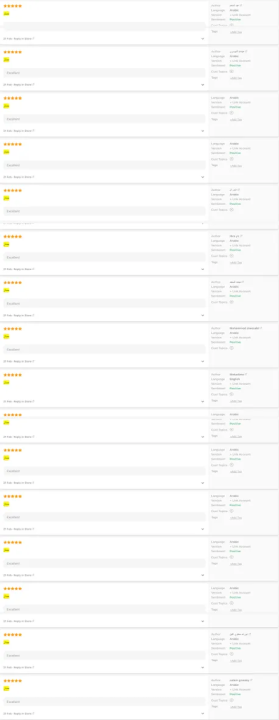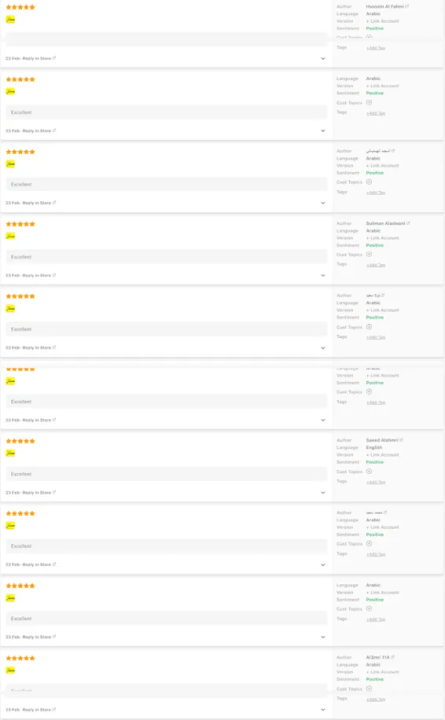Surging Saudi Reviews Hit Apps
Inauthentic spike in user ratings hit after Saudi app criticized for user surveillance
Surging Saudi Reviews Hit Apps

BANNER: (Source: @DFRLab)
Just days before Google and Apple’s investigation into the controversial application Absher, Saudi users surged the app’s Google Play and Apple iOS store ratings to post “excellent” reviews, thereby artificially inflate the app’s average rating.
The app, normally used to apply for jobs and submit Hajj application permits, received sharp criticism following reports that it was also being misused by Saudi men to track women’s travel logs. After Insider reported on the incident, Google and Apple were asked to investigate the issue and take a stance as to whether the app should be removed from their stores. On March 2, 2019, Google stated that the app had not violated its terms of service. Apple, however, has not yet released a statement regarding the app, which remains available in the iOS store.
@DFRLab found a coordinated effort on app stores among Saudi users that aimed to overturn the negative narrative regarding the app.
The analysis suggested that spikes in activity and ratings were coordinated, as opposed to posted organically over time by users. There were sharp rises in the number of positive-ratings on app stores, as well as messages on Twitter that called for ending the discussion about the app’s use for surveillance purposes.
iOS Store
On February 17, 2019, the app saw a dramatic surge in ratings and reviews on the iOS app store. Fifty percent of the app’s reviews were posted on a single day. The app received 12,775 reviews on February 17, almost four days after Apple said it would investigate the app. The spike in app reviews was first noted by Marc Owen Jones, a professor at Hamad Bin Khalifa University.
Absher saw a spike in star ratings as well, receiving more than 85,000 5-stars and 3,500 4-stars within a week. By the end of the day on February 20, the app had 86,587 ratings. These spikes suggest that app supporters had launched a coordinated attempt to make it appear as if the Absher app was popular and uncontroversial.



Google Play
On the Google Play Store, the app received two waves of reviews. The first wave crested on February 18, just days after media outlets reported that U.S. Senator Ron Wyden of Oregon wrote a letter to Apple’s CEO Tim Cook and Google’s CEO Sundar Pichai, saying, that the app “enables Saudi men to track and control the movements of Saudi women” and asked them to remove Absher from their app stores. For his stance on the app, Senator Wyden received sometimes harsh criticism from some Saudi Twitter accounts.

On the Google App store, some of the app reviews featured repeated comments. The Arabic word “ممتاز,” which translates to “excellent,” was repeated frequently, including with particularly heavy regularity on February 21 and 23.


On Twitter, @DFRLab observed similar coordinated efforts. Tweets with the hashtag #i_support_ABSHER had a reach of about 218 million impressions, generated by 50,000 users. About 88 percent of the reach of the hashtag was from retweets. This number is unusually high for purely organic traffic, as retweets typically constitute between 50 and 75 percent of traffic.

According to @DFRLab’s Sysomos scan, 85.8 percent of tweets were from male accounts, which highlighted that the engagement on the conversation was purely driven by Saudi men.
Hoaxy, a tool by Indiana University that uses Twitter’s API to provide bot scores on accounts, revealed that out of 967 accounts at least 120 exhibited high bot-like characteristics.

Conclusion
@DFRLab’s analysis confirmed the existence of a coordinated effort to shift the narrative on, and to influence perception of, the Absher application. Despite that effort, however, and even in light of the overwhelming negative attention the app had received for its sinister “women-tracking” feature, both Google and Apple decided to keep the Absher app on their respective app stores.
It is unclear, however, how the companies conducted their investigations. That Saudi users succeeded in inflating the app’s ratings amid concern that the app may be removed from app stores nonetheless highlights the potential for abuse inherent in app rating and review systems.
Follow along for more in-depth analysis from our #DigitalSherlocks.



